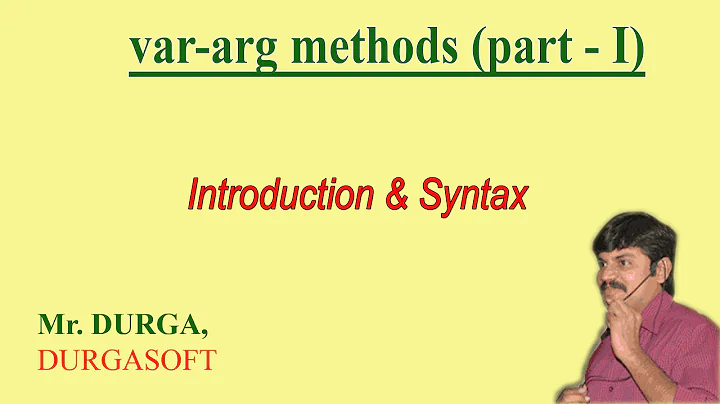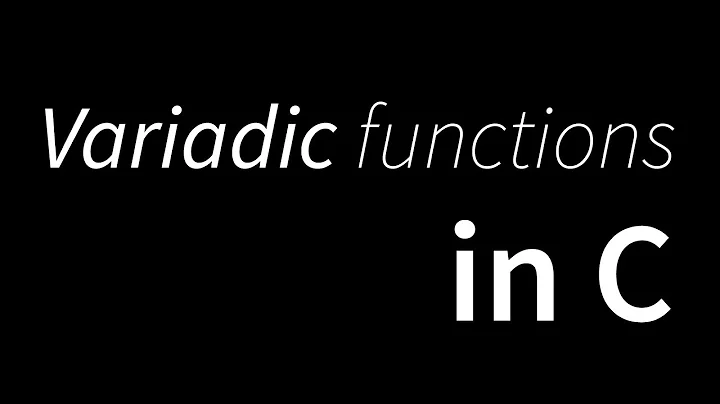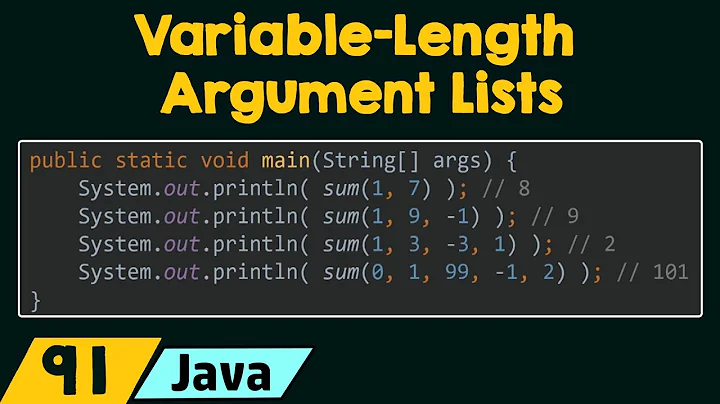varargs and the '...' argument
Solution 1
From the docs on varargs:
The three periods after the final parameter's type indicate that the final argument may be passed as an array or as a sequence of arguments.
So you can pass multiple arguments or an array.
The following works just fine:
class VarargTest {
public static void main(String[] args) {
Object[] params = {"x", 1.2345f};
String s = String.format("%s is %.2f", params);
System.out.println(s); // Output is: x is 1.23
}
}
Solution 2
You can just pass an array:
public void foo(String... args) {
}
String args[] = new String[10];
foo(args);
Solution 3
The situation you are describing is going to be fairly rare: most of the time, your varargs items will be Strings, or numbers, or Widgets... it will be unusual for them to be Objects (which could be anything) or arrays.
But if the varargs argument is a bunch of Objects or an array type, then your question does arise: you can pass it a single array and then how will the compiler know whether you meant to pass an array (the one you provided), or an series of 1 item which it should PUT into an array for you?
A quick test shows the answer:
public class TestClass {
public static void main(String[] args) {
Object anObject = new Object();
Object[] anArray = new Object[] {anObject, anObject};
System.out.println("object1 = " + anObject);
System.out.println("array1 = " + anArray);
takesArgs();
takesArgs(anObject, anObject);
takesArgs(anArray); // is this the same as array1?
takesArgs(anArray, anArray);
}
public static void takesArgs(Object... stuff) {
System.out.println("The array was " + stuff);
}
}
The result of executing (your exact numbers will vary:
object1 = java.lang.Object@3e25a5
array1 = [Ljava.lang.Object;@19821f
The array was [Ljava.lang.Object;@addbf1
The array was [Ljava.lang.Object;@42e816
The array was [Ljava.lang.Object;@19821f
The array was [Ljava.lang.Object;@9304b1
So the answer is that in ambiguous cases it treats what you passed as the array instead of creating a new array to wrap it. This makes sense as you could always wrap it in an array yourself if you wanted the other interpretation.
Related videos on Youtube
Martijn Courteaux
I'm writing Java, C/C++ and some Objective-C. I started programming in 2007 (when I was 11). Right now, I'm working on my magnum opus: an iOS, Android, OS X, Linux, Windows game to be released soon on all relevant stores. The game is written in C++ using SDL and OpenGL. A couple of seeds for my name (for java.util.Random, radix 26): 4611686047252874006 -9223372008029289706 -4611685989601901802 28825486102
Updated on December 15, 2020Comments
-
Martijn Courteaux over 3 years
Consider the method declaration:
String.format(String, Object ...)The
Object ...argument is just a reference to an array ofObjects. Is there a way to use this method with a reference to an actualObjectarray? If I pass in anObjectarray to the...argument - will the resultant argument value be a two-dimensional array - because anObject[]is itself anObject:Object[] params = ....; // Make the array (for example based on user-input) String s = String.format("%S has %.2f euros", params);So the first component of the array (Which is used in the
String.formatmethod), will be an array and he will generate:[class.getName() + "@" + Integer.toHexString(hashCode())]and then an error because the array size is 1.
The bold sequence is the real question.
This is a second question: Does a...array/parameter have a name?-
Martijn Courteaux over 14 yearsSorry, I had to test it before asking... I think I had this problem a long time ago.
-
-
 Esko over 14 yearsI'm not going to even bother adding my own answer, edit in "... is known as vararg or variable arguments and requires 0..n elements of specified elements" or something like that.
Esko over 14 yearsI'm not going to even bother adding my own answer, edit in "... is known as vararg or variable arguments and requires 0..n elements of specified elements" or something like that. -
Bart van Heukelom over 13 yearsSo if you want to call the method with a single argument and it happens to be an array, you have to explicitly wrap it in another.
method(new Object[]{array}); -
amara almost 13 yearsor do
method((Object)array), which will auto-wrap -
Sizons almost 9 yearsI'm better off than before I saw these explanations about vararg parameters, yet I still just don't get it.









